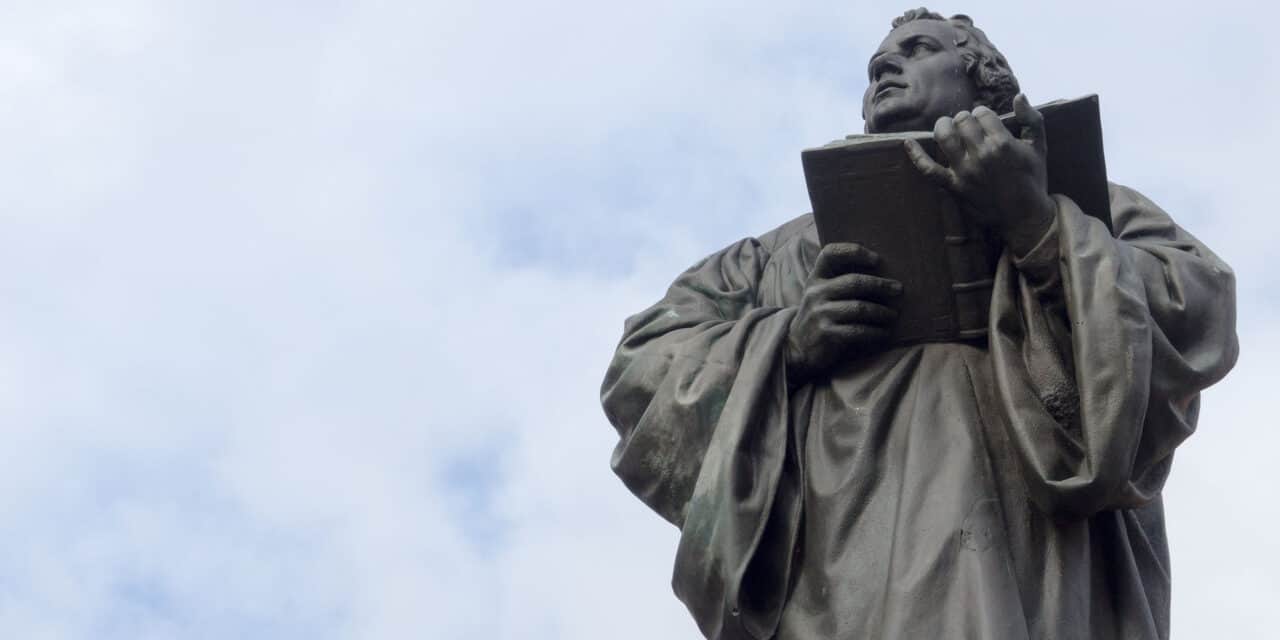Jeremiah 6:16 says, ‘Thus saith the LORD, Stand ye in the ways, and see, and ask for the old paths, where is the good way, and walk therein, and ye shall find rest for your souls. But they said, We will not walk therein.’
505 years have passed since Martin Luther posted the 95 theses on the door of Wittenberg church on the 31 October 1517. Time has an uncanny effect on man’s puny memories and a great part of evangelical Protestantism has conveniently forgotten or neglected this historic event of the 16th century Reformation. There is a dire need to revisit it and renew our interest in the spiritual significance and historic value of this momentous event for all Christians. Today we need a reinvigorated fervour and insight and a sobering rehearsal of this historic event for the cause of Christ in these last perilous days of effectual gospel witness and the vigilant defence of the most holy faith.
Understanding the Historical Setting
In the Church of the Middle Ages, the religious community experienced a period of wide-spread spiritual and moral corruption and bankruptcy in its religious life, practicing the deadly sins of arrogancy, covetousness, lust, misuse of religion, gluttony, deception and sloth. There were great spiritual and moral declension and abuses among the clergy and the church was in a absolute spiritual stupor and the adverse effects were finally felt after many centuries. This was noted at the Council of Constance, where prelates and cardinals attempted to combat declension and corruption in the Church, beginning in 1414 when 3 so called popes were vying for the same top position. They tried to resolve this and finally had to call a council to address these intractable problems. At about the same time,
John Huss (c 1372-1415), a God honouring Bohemian Pastor and Reformer, was unjustly excommunicated for his biblical preaching and teaching of the word and was forced to go to Constance for trial supposedly under the safe conduct of the Emperor Sigismund. The Bishops of Constance imprisoned him despite the failure to prove the so called ‘errors’ in his pamphlets. The Council unfairly condemned him to the stake, a painful death he suffered courageously in 1415 and in the process, revived Bohemia to stand up to religious tyranny. Other devout Christian leaders, such as the English Professor, John Wycliffe, who stood against transubstantiation and translated the English bible from the Latin vulgate, Savonarola, Jerome of Prague and Hus had urged Christians to return to the Scriptures for a true renewal of Christian faith and life. The Waldenses of the 13th century are faithful Christians and Thomas Kempis called believers to follow Jesus, through his reflections in his Imitation of Christ (c 1418) and others too. After the Council of Constance, the call for reform grew even more insistent and intense and there was no turning back.
Work of the Magisterial Reformers
Martin Luther (1483-1546), a man called of God for such a time as this, became a divine catalyst for what is called the 16th century Protestant Reformation today. Martin Luther was called of God who later became an Augustinian monk after his theological training. He was born at a time when the Church, under Pope Alexander VI of the Borgia family, was in a spiritual decline. To rebuild Rome’s pristine church, Pope Leo X was involved in the sale of indulgences (or forgiveness tickets) for the remission of all sins on earth and in purgatory. The sale of these indulgences by professional monks like Johann Tetzel, with much of the profit going for to the building of St Peter’s Basilica in Rome. About the same time, Luther providentially has a deep concern for his soul and to have peace with God and attempted to save himself with rituals and works, kneeling on the stairs of St. Peter to do penance for his sins but to no avail. His rediscovery of the truth came suddenly in his teaching in Wittenberg University and the study of Romans that the ‘just shall live by faith’ in the unmerited grace of God shown in the life, death and resurrection of Jesus Christ (Rom 1:16-17). Although the teachings of Paul were known in the Church, his central message of the unmerited graciousness of God In salvation alone had been neglected by the medieval church for many centuries during the dark ages.
Luther was regenerated by the Spirit of God and he expressed his insights publicly in the 95 Theses that were then posted on the wall of the church for intellectual debate. He did not know that it would turn out to be a worldwide rallying point that would convulse Europe in a great spiritual awakening by the will of God. In 1520, he also wrote tracts, printed on the new presses that had previously made the Bible and pamphlets available to the public. James Hutchinson Smiley added that these tracts included An Address to Christian Nobility, which urged nobles to join in the reform of the Church; the Babylonian Captivity of the Church, which attacked the
Church’s sacramental system that deny the Christian of the true benefits of the glorious gospel of Christ; and freedom , in which Luther proclaimed the freedom of Christians from a works’ righteousness, to freedom in God’s promises to those who live by grace and by faith alone. Because of his teachings, Luther was summoned to the city of Worms for trial in April 1521, which was presided over by Emperor Charles V. In his defence, Luther appealed to the Scriptures, under which authority both of his powerful adversaries, the Emperor and the Pope, professed to live. He held that unless he was proven wrong by the scriptures, ‘I shall not and cannot recant, so help me God”. Tradition also suggested that he exclaimed, ‘Here I stand, I cannot do otherwise.” Luther, who was supposed to face certain death ironically was not harmed although he was declared a heretic and condemned for 21 days by the Emperor. He was to be hunted by the forces of the Emperor but mysteriously, he was kidnapped, hidden and protected by the Elector Frederick the Wise, in Wartburg castle for 10 months under the name of George where he translated the German NT from Greek by 1522. The hymn, a Mighty Fortress is our God was composed by Luther as a result of this incident. The magisterial reformers of the age included Luther, Calvin, and Zwingli stood for a spiritual renewal and reformation of the medieval church that was steeped in superstition, lifeless ceremonies, rituals and tradition. They returned to the authority and perspicuity, sufficiency to Holy Scriptures as the bedrock and foundation of our faith and rediscover true freshness and vitality of the written word that was missing in the medieval church then. They found the doctrines of saving grace in justification by faith (not by works), the universal priesthood of believers (not through the confessional box of a celibate priesthood), the authority and sufficiency of the Holy Scriptures (not though the decrees of synods and encyclicals of a man). Their newfound faith that was lost for almost 1,000 years liberated souls by the triumphant and living faith in Christ alone. This spread all over Western Europe from Germany to Switzerland, England, Scotland, France and Holland and some of the Scandinavian countries by the end of the 16th century. A historic meeting at the Diet of Worms in April 1521 sealed these irreconcilable differences between the newly formed Reformation party and the established medieval Church. The Reformation was on good footing to fully realize its doctrinal and practical implications and it was unstoppable.
The Legacy of the Reformation
The Reformation was a blessing to Europe for it brought about benefits like universal literacy and education as promoted by the Reformers. This is made all the more important because of the availability of the Bible and the expanding learning of those years. Calvin was well trained with profound medieval intellectual learning during the Renaissance and his skills were greatly used of God to write the Institutes of the Christian religion in 1536 and other Bible commentaries. (The Reformers considered the teacher among the Church offices sanctioned in the Scripture.) All believers, the Reformed held, should have access to the Scriptures, the rule of faith, life and learning and were called to serve God with all the gifts of divine grace. Therefore, Calvin and his followers stressed universal education which included reading the Bible. In Geneva, for example, the Ecclesiastical Ordinances ruled that the “youths should be faithfully instructed.” This included poor youths and women, who were to receive elementary education. This was a vital step in the advancement of the wellbeing of women. Calvin participated in this process and led in the revival of Geneva with the practice of universal education and strict ecclesiastical discipline under the Presbyterian polity though not well understood and received initially. Massive changes that took place in Geneva during Calvin’s life, brought about by the higher hand of God where his supposedly one day stay in Geneva turned into 25 years of service when he was challenged by William Farel. The Reformed teaching from the word of God stimulated the mind of believers to the economic benefit of the western society and the world at large. The protestant work ethic was soon all over Europe which fuelled its spiritual, social and economic development and progress of the western nations for centuries, leading to them being well developed countries today.
The Reformation made a significant contribution in the political reforms primarily through the participation of people in representative constitutional governments. Civil magistracy is a gift of God to encourage just and compassionate human behaviour and to discourage and restrain evil. The Reformers knew this from their studies of the Greek and Roman classics and through history. James Hutchinson Smylie in “A brief history of the Presbyterians” says, “The various forms of government and their dangers – monarchy and tyranny (the rule of one), aristocracy and oligarchy (the rule of the few), democracy and mobocracy (the rule of the mob). They moved toward a participatory and representative system of government in ecclesiastical matters as well as in the political sphere. They advocated a combination of democracy with an aristocracy of merit as the best form of government.” The Presbyterian form of church polity was introduced as a biblical model of church governance with elders and deacons as officer elected in the church. This form would provide the proper checks and balances in the church and the presbytery and to promote civic responsibility and to prevent abuse. This will be a precursor to the democratic parliamentary systems in various forms in many countries today.
Reformed yet Reforming
Today after half a century, nothing much has changed except that the tone and tactics of the medieval church in the modern era is more conciliatory. The world’s ecumenical movement has included the new age, the cults and word of faith movement and the questionable alpha course which helped to cement ties between the Roman church and Protestant churches in recent years. There are more voices in support of a superficial organizational unity at the expense of truth, thus undermining a vital spiritual heritage of the reformed faith of our fathers who defended the truth with their lives. Paul in 2 Thessalonians 2:15 warns, “Therefore, brethren, stand fast, and hold the traditions which ye have been taught, whether by word, or our epistle.” Paul states clearly all churches of danger from within and our duty to warn others in Act 20:28-31, “Take heed therefore unto yourselves, and to all the flock, over the which the Holy Ghost hath made you overseers, to feed the church of God, which he hath purchased with his own blood. For I know this, that after my departing shall grievous wolves enter in among you, not sparing the flock. Also of your own selves shall men arise, speaking perverse things, to draw away disciples after them. Therefore watch, and remember, that by the space of three years I ceased not to warn every one night and day with tears.”
There is a greater peril of surrendering our spiritual heritage and foundation to accommodate and placate the increasing demands for a united religion first to prepare for the way of the anti-Christ regime. The ecumenical movement has increased tremendously in influence and membership over the past 7 decades and many denominational and independent churches are under duress to join and accommodate them. Yet 2 Chronicles 19:2 says, “And Jehu the son of Hanani the seer went out to meet him, and said to king Jehoshaphat, Shouldest thou help the ungodly, and love them that hate the LORD? therefore is wrath upon thee from before the LORD.”
Challenges of the Reformers
The Reformation was not without problems. There were setbacks and obstacles as seen in a few incidents. Firstly, it was the Peasants’ Revolt of 1523 that adversely affected the good name of the Reformation. Luther had to come out publicly and denounced the violence due to zealots and overly excited followers who attacked and burned buildings and rebelled against the authorities physically. Extreme zeal and fanaticism will not have a positive contribution to the cause of Christ and some are guilty of it today with excessive fervour for causes not according to true knowledge (Rom 10:1, 2). Secondly, it is the disunity between the German and Swiss Reformation by the disagreement between Luther and Zwingli at the Marburg Colloquy of 1529. The division was so sharp and divisive that they parted angrily over one issue of the Lord’s Supper (agreeing on 14 others) and adversely affected the united front and effectiveness of the Reformation Movement. It need not end this way but the sovereignty of God had allowed it. The wrath of men does not work out the righteousness of God and we must remember that today and not make the same mistake again.
Thirdly, there was a sad incident in the Swiss Reformation when Zwingli took part in the military battle of Kappel in 1531 and was killed prematurely, leaving Bullinger his successor to continue the Reformation. From hindsight, is it necessary to be engaged in physical combat to address the cause of Christ? Satan has often successfully undermined our genuine efforts to serve the Lord by extremism and fanaticism which has often divided the church, but we acknowledge that the hand of God permitted this to happen. These are humbling and sobering lessons for us today as we must contend for the faith in the right manner and failure to do so will give Satan a foot hold to destroy or divide us to our detriment and to the loss of our effective witness for Christ to the world. These can be serious consequences of our times. There are also other issues with regards to the different styles of the Reformers, the vestments controversy in the Anglican Church In the UK as highlighted by the puritans, and the controversial way in which Michael Servetus, the heretic and some the Anabaptist leaders were dealt with for some. But each has to be examined carefully in its proper context to get the full and correct perspective . It only reminds us that we need always to be prayerful, patient and humble and to always seek the will of God and keep close to God’s leading in doing God’s work.
There are graver dangers ahead of us in this 21st century as the last days come to a close. The world will be generally in favour of a one world religion that will support a world global order to be managed by one supreme world leader who has political and economic, military, religious backing and power to solve global issues (2 Thessalonians 2:7-21).The recent global COVID19 pandemic shows us that the countries of the world needs to collaborate to tackle global issues and some form of people control is inevitable and may be needful in days to come if we have another pestilence worldwide . Persecution of Christians is on the increase as many are intolerant of the Christian faith as reported in some incidents in some countries in Asia, Middle East and the western world recently with the rise of homosexuality and transgenderism, abortion, euthanasia, cloning and other ethical issues. The so coming world’s supreme leader (Anti-Christ which will precede Christ temporally in world dominion and power in the last days) will bring false peace and impress many and finally, will persecute the church through the later part of the seven years of tribulation if the Lord tarries. Those will be extremely difficult days of great testing and we are to be strong and vigilant with patience and perseverance of the Lord in those final moments of human history (Matthew 24:1 – 24).
Reformation in Progress
Is the Reformation really over with the peace treaty of Westphalia in1648? There is still much to be done today in the face of what had happened in the past and present. Firstly, there is still a grave need to continue to contend for the faith once delivered to the saints and to propagate the pure and unadulterated gospel and to disseminate and defend the word in a climate of growing liberalism, mysticism, atheism and agnosticism. The issues of rising worldwide global compromised mass evangelism (i.e. the questionable prosperity Gospel and the false teaching of healing in the Lord’s Supper and the popular Alpha Course with a truncated gospel used by some churches), the new age movement and sound biblical separation is still needed with regard to the New Age, liberal and ecumenical Movements, as well as the cult and occultic influences. The International Council of Christian Churches which was formed in 1948 In defence of the faith continues today and the 75th Congress will be held in New Jersey, USA next year under the leadership of Dr Brad Gsell and his team, God willing, and they need much prayers and support from the Christian constituency. Secondly, Hosea 4:6 says, ‘My people are destroyed for lack of knowledge: because thou hast rejected knowledge, I will also reject thee, that thou shalt be no priest to me: seeing thou hast forgotten the law of thy God, I will also forget thy children.’ The church needs to be knowledgeable of the truth as ignorance is not bliss and the Westminster Confession (or the Belgic or Heidelberg Confession and the Canons of Dort) needs to be taught to the parishioners less we forget our reformed heritage. The Reformation stood for the profound knowledge of the Word and its liberating saving impact in the Church, family, personal lives and we desperately need a renewal of the same today. Are you rooted and grounded properly in the Word of God today in the true spirit of the Reformers or do the sensational, temporal gifts, healing services and so-called miracles excite and rule your lives? We need to build up sound Reformed churches and families grounded and rooted in the Word of God and in the understanding and practice of the Reformed faith.
Conclusion
Paul in Phil 1:27 says, ‘Only let your conversation be as it becometh the gospel of Christ: that whether I come and see you, or else be absent, I may hear of your affairs, that ye stand fast in one spirit, with one mind striving together for the faith of the gospel;’ We need to seek the Lord for godly discretion and pray for courage, perseverance and divine discernment in these days and be willing to declare, defend and preach the pure and unadulterated gospel while there is yet freedom and opportunities. We are not to be slack but fervent and faithful in these days of religious trials and ecclesiastical compromise. Matt 24:14 says, “And this gospel of the kingdom shall be preached in all the world for a witness unto all nations; and then shall the end come.” May the Lord preserve and strengthen us and give us the godly prudence and gumption to be faithful to Christ till the very end in trying, uncertain and perilous end times.





